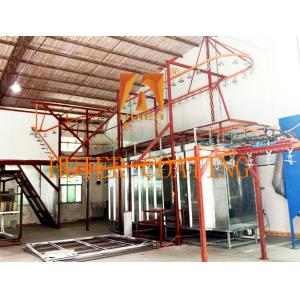

Add to Cart
I. Core Functional Components
1. Heating System
Heating Elements: Stainless steel electric heating elements (2–3kW
per element), gas burners, or hot air circulation devices, with
maximum temperatures reaching 250°C (standard) or 800°C (special
requirements).
Hot Air Circulation: Three-sided circulation design with
multi-blade impellers and high-temperature-resistant motors ensures
a temperature difference within the furnace of ≤±3°C.
2. Temperature Control System
Control Module: Integrated PLC and PID algorithm, supports
multi-stage programming (over 50 levels), temperature accuracy of
±1–5°C, and a touchscreen displays real-time temperature curves and
operating status.
Safety Protection: Over-temperature power off, leakage protection,
motor overload protection, and fault alarms.
3. Smoke Exhaust and Ventilation
Exhaust Gas Treatment: Built-in exhaust system with activated
carbon filtration or direct exhaust, meeting environmental
standards.
II. Key Performance Parameters
| Parameters | Specification Range |
| Temperature Range | Room Temperature–250°C (Extended to 800°C) |
| Conveying Speed | 0.5–5 m/min (Stepless Frequency Control) |
| Power | 5.5 kW–140 kW (Customizable by furnace length) |
| Applicable Materials | For wheel hub spraying, electronic components, lithium batteries, food, etc. |
III. Operational Procedures and Maintenance
1. Operational Procedures
Preheating: Run the furnace unloaded to the set temperature (the
first time you use the furnace, dry it to remove moisture).
Loading: Suspend the material on chains or fixtures to prevent
accumulation that affects hot air circulation.
Operation: After starting the process, monitor the temperature
curve and adjust the conveying speed to match process requirements.
Cooling: After the process ends, allow the furnace to cool
naturally or activate the forced air cooling system.
2. Maintenance Points
Cleaning: Regularly clean the furnace chamber of any residue and
check the lubrication of the chains.
Inspection: Quarterly calibrate the thermocouples and inspect the
heating element connections and electrical wiring insulation.
IV. Safety and Design Advantages
1. Safety Design
Explosion-Proof Structure: Equipped with a pressure relief valve,
explosion-proof door lock, and flame arrester, it is suitable for
flammable and explosive working conditions.
Multiple Protections: Independent over-temperature protection, door
open/shutdown sensor, and fault self-diagnosis. 2. Technical
Advantages
Energy Saving and High Efficiency: Thermal cycle technology reduces
energy consumption by over 30%, and the waste heat recovery system
improves overall energy efficiency.
Automated Production: Supports continuous operation and pre-stores
multiple sets of process parameters to meet flexible manufacturing
needs.
I. Main Structure
1. Casing and Frame
Material: The casing is made of cold-rolled steel or 304 stainless
steel, with a spray-coated or rust-proof finish for
high-temperature corrosion resistance. The inner chamber is made of
1.5mm thick 304 stainless steel, meeting food-grade hygiene
standards.
Furnace Design: A segmented, fully enclosed structure (single
segment length up to 16.2 meters). The insulation layer is filled
with ceramic fiber or high-density rock wool (thickness ≥ 100mm),
achieving a heat dissipation rate of ≤5%.
2. Suspension Conveyor System
Chain and Track: Equipped with high-strength stainless steel chains
or tracks with a spring tensioner, the conveying speed is
adjustable (0.5–5m/min), accommodating materials of varying sizes.
Suspension Clamp: A high-temperature-resistant metal clamp or hook
ensures stable suspension and even heating of the material.
II. Core Functional Components
1. Heating System
Heating Elements: Stainless steel electric heating elements (2–3kW
per element), gas burners, or hot air circulation devices, with
maximum temperatures reaching 250°C (standard) or 800°C (special
requirements).
Heat Circulation Design: A three-sided hot air circulation layout,
combined with a high-temperature-resistant multi-blade impeller and
centrifugal fan, ensures a temperature difference within the
furnace of ≤±3°C.
2. Temperature Control System
Control Module: Integrated PLC and PID algorithm, supports
multi-stage programming (over 50 levels), and boasts a temperature
accuracy of ±1–5°C. The touchscreen displays real-time temperature
curves and operating parameters.
Monitoring and Protection: Multi-point thermocouple monitoring,
over-temperature power outage, leakage protection, and motor
overload alarm.
3. Smoke Exhaust and Ventilation
Exhaust Gas Treatment: Built-in exhaust ducting and activated
carbon filtration meet environmental emission standards and reduce
the escape of harmful gases.
III. Auxiliary Systems and Safety Design
Safety Protection: Equipped with a pressure relief valve,
explosion-proof door locks, and flame arresters to accommodate
flammable and explosive working conditions.
Energy-Saving Design: Hot air circulation technology reduces energy
consumption by over 30%, and a waste heat recovery system improves
overall energy efficiency.
IV. Technical Parameters of Key Components
| Components | Specifications and Features |
| Heating element | Stainless steel heating element (2–3kW/unit) |
| Conveyor speed | 0.5–5m/min (stepless variable speed control) |
| Temperature uniformity | ≤±3°C (no-load) |
| Insulation thickness | ≥100mm (ceramic fiber) |
1.High cost performance: Based on the customer's product
positioning and development strategy, and with economic
affordability as the foundation, we achieve the best cost
performance.
2.The advanced and meticulous design concept of the equipment,
along with the highly automated industrial equipment, showcases the
image of a modern and advanced enterprise.
3. It has high adaptability, meeting the current production
requirements and reserving room for development, taking into
account the needs of increased production and improved quality in
the future.
4.Quality compliance strictly adheres to the ISO900 quality
management system, with every minute detail of the entire equipment
installation being strictly controlled.
